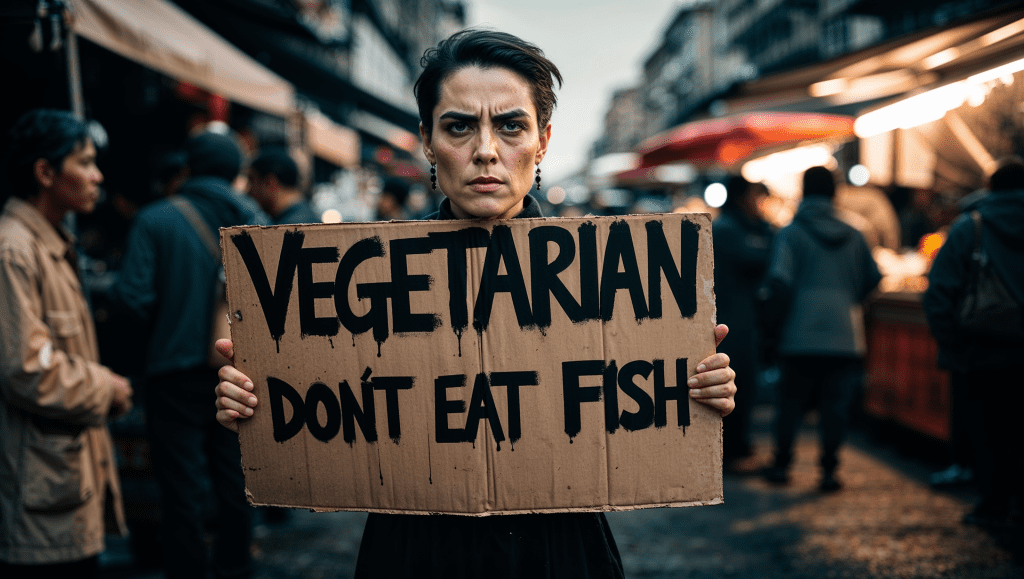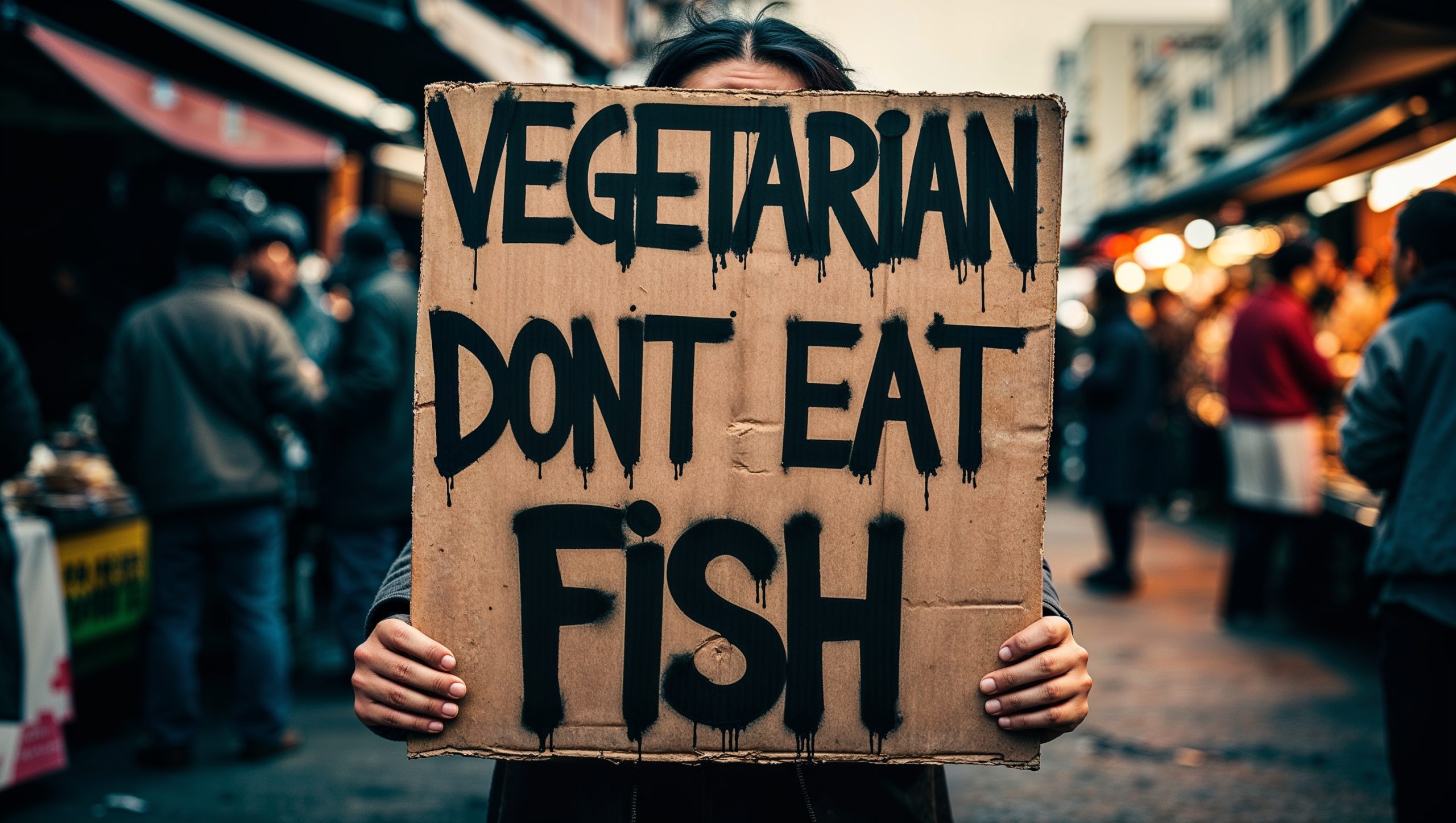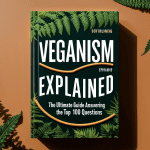The question “Do vegetarians eat fish?” often ignites spirited discussions and debates among food enthusiasts, health advocates, and environmentalists alike. This seemingly simple inquiry delves into the complex landscape of dietary choices, where definitions can vary, and personal beliefs shape our understanding of food.
Defining Vegetarianism
Traditionally, the term “vegetarian” refers to individuals who abstain from eating meat, encompassing red meat, poultry, and seafood. This dietary choice is typically motivated by a combination of ethical, environmental, and health considerations. Vegetarians embrace a plant-based lifestyle, focusing on fruits, vegetables, grains, legumes, nuts, and seeds.
However, the classification of vegetarianism is not as straightforward as it may appear. As dietary practices evolve, so too do the definitions and interpretations of what it means to be a vegetarian. This leads us to the critical question of fish consumption.
The Spectrum of Dietary Choices
In contemporary discussions about vegetarianism, it’s essential to acknowledge the existence of various dietary classifications that contribute to the complexity of this topic. Here are a few key distinctions:
- Lacto-Vegetarians: This group consumes dairy products but avoids eggs, meat, and fish. They prioritize plant-based foods while incorporating dairy for additional nutrients.
- Ovo-Vegetarians: These individuals include eggs in their diets but exclude dairy, meat, and fish. For them, eggs serve as a protein source while still adhering to a predominantly plant-based diet.
- Lacto-Ovo Vegetarians: This classification embraces both dairy products and eggs, allowing for a more diverse range of food options while still avoiding meat and fish.
- Pescatarians: Often considered a distinct category, pescatarians consume fish and seafood but abstain from other meats. While they enjoy the health benefits of fish, they still prioritize plant-based foods in their diets.
Why the Confusion?
The confusion surrounding whether vegetarians eat fish often arises from the inclusion of pescatarians in broader discussions about plant-based diets. Many people might mistakenly refer to pescatarians as vegetarians, blurring the lines between the two dietary choices.
For traditional vegetarians, avoiding fish aligns with their ethical beliefs about animal rights and environmental sustainability. The fishing industry raises significant concerns regarding overfishing, habitat destruction, and bycatch (the unintended capture of non-target species). Thus, vegetarians often advocate for a diet that excludes all forms of meat, including fish.
Health Considerations
From a health perspective, vegetarian diets have been associated with numerous benefits, including reduced risks of heart disease, high blood pressure, diabetes, and certain types of cancer. The absence of fish in a vegetarian diet does not negate the health advantages of plant-based eating. In fact, many vegetarians find alternative protein sources, such as legumes, nuts, and seeds, to meet their nutritional needs.
However, some argue that fish can provide health benefits, including omega-3 fatty acids and high-quality protein. This perspective has led to a debate on whether incorporating fish into a primarily plant-based diet might offer advantages while still aligning with health goals.
The question of whether vegetarians eat fish invites a deeper exploration of dietary definitions and individual choices. Traditional vegetarians do not consume fish, as their dietary practice centers around the exclusion of all meat products. Yet, with the emergence of dietary variations like pescatarians, the conversation becomes more nuanced.
Ultimately, understanding these distinctions fosters respect for individual dietary preferences and encourages informed choices that align with personal values, health objectives, and environmental considerations. The beauty of food lies in its diversity, allowing each person to curate a diet that suits their unique lifestyle. Whether one adheres strictly to a vegetarian diet or includes fish, the key is to embrace the journey of discovering what nourishes the body and soul.
What is a Vegetarian?
A vegetarian diet typically excludes all forms of meat, including red meat, poultry, and seafood. Instead, vegetarians focus on plant-based foods such as fruits, vegetables, grains, legumes, nuts, and seeds. This dietary choice is often motivated by a combination of ethical, environmental, and health considerations.
The Different Types of Vegetarians
While the core principle of vegetarianism is the avoidance of meat, there are several variations that expand upon this definition:
- Lacto-vegetarians: These individuals consume dairy products but avoid eggs, meat, and fish.
- Ovo-vegetarians: They include eggs in their diet while excluding dairy, meat, and fish.
- Lacto-ovo vegetarians: This group consumes both dairy products and eggs but avoids meat and fish.
- Pescatarians: Though often considered a separate dietary category, pescatarians include fish and seafood in their diet while abstaining from other meats. This group may be mistakenly referred to as vegetarians by some.
The Misunderstanding Around Fish and Vegetarianism
The confusion surrounding whether vegetarians eat fish often stems from the inclusion of pescatarians in broader discussions about plant-based diets. This misunderstanding can lead to misconceptions about what it means to be vegetarian and how dietary choices can overlap. To clarify this distinction, it’s essential to explore the definitions of these dietary practices and the reasons behind them.
Defining the Terms
Vegetarianism is a dietary practice that traditionally excludes all forms of meat, including poultry, red meat, and seafood. The commitment to a vegetarian lifestyle is often driven by ethical, health, and environmental concerns. For many vegetarians, abstaining from fish is a natural extension of their beliefs about animal welfare and the environmental impact of fishing.
On the other hand, pescatarianism is a dietary choice that includes fish and seafood while still focusing primarily on plant-based foods. Pescatarians enjoy the health benefits associated with fish, such as omega-3 fatty acids, which are crucial for heart health and brain function. They may incorporate fish into their diets for additional protein without entirely abandoning a plant-based approach.
The Overlap and Confusion
The overlap between pescatarians and vegetarians can create confusion, especially when discussing dietary choices in social settings or nutritional discussions. Many people mistakenly refer to pescatarians as vegetarians due to their plant-centric diets. This blurring of lines can lead to misunderstandings about the principles behind vegetarianism and the ethical considerations that guide those who choose to abstain from all meat, including fish.

Ethical Considerations
For traditional vegetarians, the exclusion of fish from their diets often aligns with their ethical stance on animal rights. The fishing industry poses significant ethical dilemmas, including issues of overfishing, habitat destruction, and the impact of bycatch—where non-target species are unintentionally caught. Many vegetarians believe that avoiding fish is a way to reduce harm to aquatic life and promote sustainable food practices.
In contrast, pescatarians may argue that incorporating fish allows for a more varied diet while still prioritizing plant-based foods. This perspective often leads to the perception that pescatarians are a more flexible option for those who want the benefits of seafood without fully committing to a meat-heavy diet.
Health Benefits and Nutritional Aspects
Both vegetarians and pescatarians can enjoy health benefits from their respective diets. Research suggests that a plant-based diet can lower the risks of chronic diseases, such as heart disease, hypertension, and certain cancers. Vegetarians can obtain protein and essential nutrients from legumes, nuts, seeds, and whole grains, ensuring a balanced intake.
Pescatarians, however, have the added advantage of including fish, which provides high-quality protein, omega-3 fatty acids, and essential vitamins and minerals. This can lead to a perception that pescatarianism offers a more well-rounded nutritional profile, making it appealing for those seeking to enhance their dietary health.
Ethical and Health Considerations
For many vegetarians, avoiding fish aligns with their ethical beliefs about animal rights and environmental sustainability. The fishing industry has been associated with overfishing, habitat destruction, and bycatch (the unintentional capture of non-target species), raising significant concerns for those who prioritize environmental stewardship.
On the health front, vegetarian diets are often praised for their potential benefits, such as reduced risks of heart disease, high blood pressure, diabetes, and certain types of cancer. However, some argue that fish can be a healthy protein source, rich in essential nutrients. This has led to a debate about whether including fish might offer some health advantages while still adhering to a predominantly plant-based lifestyle.
Traditional vegetarians do not eat fish, as their diet is rooted in the exclusion of all meat products. However, variations like pescatarians embrace fish as part of their dietary choices. Understanding these distinctions can help clarify conversations around vegetarianism and foster respect for individual dietary preferences.
Whether one adheres strictly to a vegetarian diet or includes fish, the key is making informed choices that align with personal values, health goals, and environmental considerations. Ultimately, the beauty of food lies in its diversity, allowing individuals to choose what works best for them and their lifestyle.
Understanding dietary choices can be complex, especially when it comes to vegetarianism. A common question that arises is whether vegetarians eat fish. By definition, vegetarians do not consume meat, which includes fish. However, there are variations in dietary practices, such as pescatarians, who include fish in their diets while avoiding other types of meat.For those interested in exploring vegetarianism or simply expanding their plant-based cooking skills, a vegetarian cookbook serves as an excellent resource. These cookbooks not only provide a wealth of delicious recipes but also offer insights into the principles of vegetarian cooking and nutrition.
Why Choose a Vegetarian Cookbook?
- Diverse Recipes: Vegetarian cookbooks feature a variety of recipes that cater to different tastes and dietary restrictions. From hearty soups and salads to innovative main dishes, these cookbooks help you discover new flavors and ingredients.
- Nutritional Guidance: Many cookbooks include sections on nutrition, helping readers understand how to maintain a balanced diet without meat. This is particularly beneficial for those transitioning to vegetarianism.
- Culinary Techniques: A good vegetarian cookbook often covers essential cooking techniques, making it easier for beginners to gain confidence in the kitchen. For example, books like How to Cook Everything Vegetarian by Mark Bittman provide foundational skills and variations on traditional dishes.
- Meal Planning: Some cookbooks offer meal plans and shopping lists, simplifying the process of adopting a vegetarian lifestyle. This can be especially helpful for those who may feel overwhelmed by the transition.
- Inspiration for All Levels: Whether you are a novice or an experienced cook, there are vegetarian cookbooks tailored to your skill level. Titles like The Complete Vegetarian Cookbook by America’s Test Kitchen include easy-to-follow recipes and essential cooking tips.
Choosing a vegetarian cookbook is an effective way to learn about plant-based cooking and make informed dietary choices. With the right resources, you can enjoy delicious meals while embracing a healthier lifestyle that aligns with your values.












